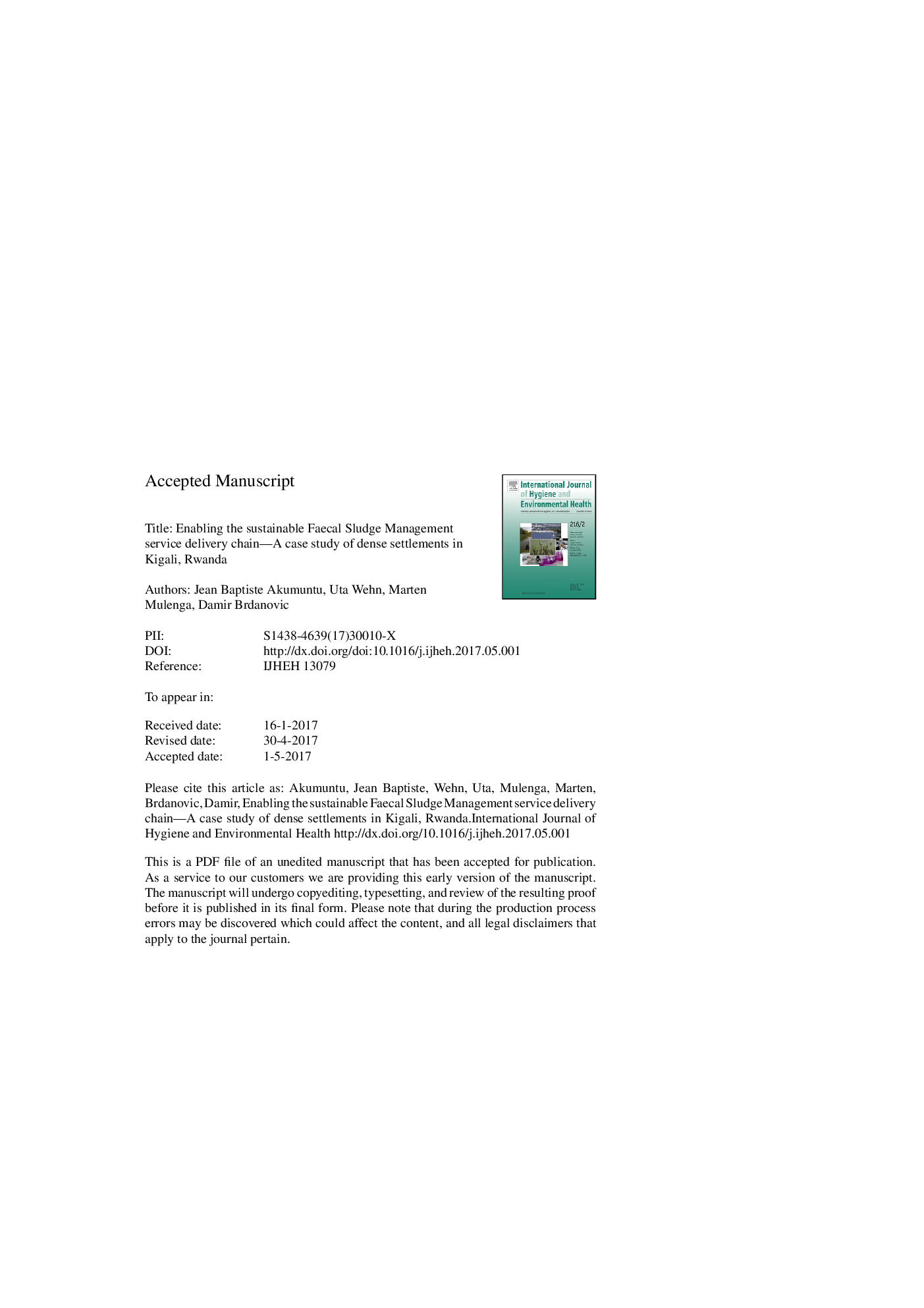| کد مقاله | کد نشریه | سال انتشار | مقاله انگلیسی | نسخه تمام متن |
|---|---|---|---|---|
| 5560472 | 1561871 | 2017 | 38 صفحه PDF | دانلود رایگان |
عنوان انگلیسی مقاله ISI
Enabling the sustainable Faecal Sludge Management service delivery chain-A case study of dense settlements in Kigali, Rwanda
ترجمه فارسی عنوان
ایجاد زنجیره تحویل خدمات مدیریت زیست محیطی پایدار فاضلاب - مطالعه موردی شهرک سازی های متراکم در کیگالی، رواندا
دانلود مقاله + سفارش ترجمه
دانلود مقاله ISI انگلیسی
رایگان برای ایرانیان
کلمات کلیدی
مدیریت لجن فاضلاب، فعال کردن محیط زیست، حکومت، موسسات، بهداشت کشورهای در حال توسعه، توسعه ظرفیت،
موضوعات مرتبط
علوم زیستی و بیوفناوری
علوم محیط زیست
بهداشت، سم شناسی و جهش زایی
چکیده انگلیسی
The lack of access to basic sanitation is a global concern and alarmingly prevalent in low- and middle- income countries. In the densely populated settlements of these countries, on-site sanitation systems are usually the only feasible option because dwellers there have no sewers in place to connect to. Using on-site sanitation facilities results in an accumulation of faecal sludge which needs to be properly managed to ensure the well-being of the users as well as the surrounding environment. Unfortunately, often the conditions for faecal sludge management (FSM) within dense settlements are adverse and thus hamper sustainable FSM. We use the normative framework of the FSM enabling environment to gather empirical evidence from densely populated settlements of Kigali city in Rwanda to examine current FSM practices and the extent to which these are being influenced and affected by the setting within which they are taking place. The analysis of the study findings confirms that the existing conditions for FSM in these settlements are inadequate. The specific constraints that hinder the achievement of sustainable FSM include limited government focus on the sanitation sector, high turnover of staff in relevant government institutions, pit sludge management is not placed on the sanitation projects agenda, the existing relevant bylaws are not pro-poor oriented, a lack of clear responsibilities, a lack of relevant local professional training opportunities, unaffordability of FSM services and an inhibition to discuss FSM. Drawing on the involved stakeholders' own perceptions and suggestions, we identify possible approaches to overcome the identified constraints and to allow all actors in the FSM chain to contribute effectively to the management of faecal sludge in densely populated low-income urban settlements. Finally, our study also presents a contribution to the theoretical conceptualisation of the enabling environment for sustainable FSM.
ناشر
Database: Elsevier - ScienceDirect (ساینس دایرکت)
Journal: International Journal of Hygiene and Environmental Health - Volume 220, Issue 6, August 2017, Pages 960-973
Journal: International Journal of Hygiene and Environmental Health - Volume 220, Issue 6, August 2017, Pages 960-973
نویسندگان
Jean Baptiste Akumuntu, Uta Wehn, Martin Mulenga, Damir Brdjanovic,
